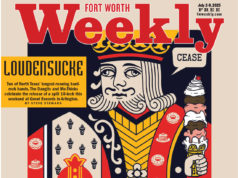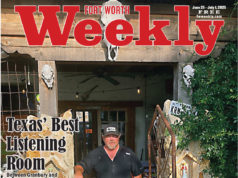Two years ago, Mac Probst was co-frontman of Movie the Band, an Irving-based five-piece that made charmingly low-fi slacker rock in the vein of Pavement, writing sarcastic, jangly, reverb-soggy guitar jams about traffic hassles and pie-in-the-sky TV aspirations. I interviewed them at the end of September 2016, when they were about to drop a five-song cassette on Dreamy Life Records (Andy Pickett, War Party, The Fibs). MTB played some shows over the next year and a half, but between then and now, they just kind of fizzled out. Probst kept making music, however, eventually taking on the moniker Summerjob. In the coming weeks, he will be releasing Summerjob’s self-titled debut via Dreamy Life.
Probst said that his old band dissolved for two big reasons: Drummer Jesse Gage quit to write and record his own music and front his own band, and Probst and his songwriting partner, guitarist/keyboardist Bryce Gammill, disagreed about what to do with the band following Gage’s departure.
“I definitely wanted to put more things out, but Bryce didn’t seem to want to do that,” Probst said. “We have a lot of music –– Bryce, [bassist] Richard [Butler] and I recorded a lot of stuff, but I don’t really know what’s going to happen with it, and that’s kind of not bothering me, but …”
Probst trailed off in thought, and I suggested that since he enjoyed writing songs, he might as well have kept writing songs, thinking that the drive to create transcends the fate of the vehicle and that perhaps Probst would elaborate on his muse or whatever.
“Yeah, I guess,” Probst said. “And if I die, I want [my music] to be arranged and out, if that makes sense. Not like, ‘Oh, we found all of this on your laptop.’ ”
Probst isn’t necessarily obsessed with leaving a legacy, and he isn’t preoccupied with death. But life is short, and he also didn’t really want to sit on his songs. For him, the DIY approach was the most obvious answer.
“I just wanted to do it myself,” he said. “I knew Jesse had done his thing all on his own, and I had always admired bigger artists that did that. And I was like, ‘I think I can do that.’ ”
Probst initially recorded at home on a digital 8-track recorder but ultimately decided to spend the money on an actual studio with an actual producer. He booked time with Britt Robisheaux (B.J. Thomas, Sub-Sahara, Jandek) at Cloudland Recording Studio this past spring.
“Everything I’ve put out has been a low-fi recording, and I wanted to make it sound better than that,” Probst said.
While the resulting album does sound bigger, fuller, and more produced than a home recording, it still bears the marks of MTB’s lo-fi sensibilities. Probst calls the music pop (“because it’s going to be popular,” he said laughing), and it certainly fits the description. The album is seven songs built on bouncy electronic beats made on consumer-model hip-hop drum machines (in particular, an Akai XR20 and some beat machine from the ’80s called a “Dr. Rhythm”) and colored with woozy, phaser-ized guitars and chintzy synths. Probst wrote a lot of the material on an old Yamaha keyboard, and Gammill, who boasts a large collection of vintage keyboards, lent him some gear he no longer uses. Rapper Juma Spears guests on “Waiting on the Fame,” Probst’s wife Kylie contributes backing vocals throughout the album, and Robisheaux plays bass on one track. But for the most part, it’s all Probst. None of the songs exceed three minutes, and most are closer to two, packing a couple of verses and a hook into tight, ear-wormy packages.
Lyrically, Probst endeavors to say a lot with a little, and, tonally, some of the songs are a little dark. “It’s a little depressing at the beginning,” Probst said. “The first song is about being hungover. The second song is about getting killed.
“I used to be really anxious about being in a car, because it’s so easy to kill or be killed in a car, like, in a split second,” he continued. “But now, I’m kind of like, ‘Eh, whatever happens happens.’ ”
Now the sole the master of his own artistic fate, Probst can release music as often as he wants, as opposed to letting future generations find it on his laptop.
Summerjob is available on digital platforms Wednesday, with a cassette release in November.












